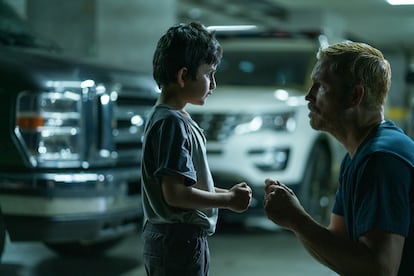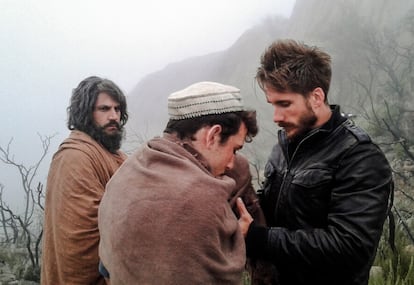Christian cinema and its faithful viewers
The success in Spain of the documentary ‘Libres’ and throughout the world of the series ‘The Chosen’ underscores that the public of religious formats is faithful to their audiovisual products and maintains their attendance at theaters


They are a faithful, loyal audience. They read specialized media outlets, especially digital ones. Every three months, approximately, they will go to the movie theaters to see a film related to their spiritual interests. The Catholic audience has not stopped going to the cinema. But from time to time their attendance multiplies and sends a striking signal, as has happened with the film His Only Son, about the sacrifice of Abraham, which opens now in Spain after making $13 million in the United States. Its production company, Angel Studios, is also behind the latest Christian audiovisual bombshell, the series The Chosen, about the life of Jesus.
“They never fail,” says the manager of a distributor who prefers to remain anonymous. “At the end of the pandemic, they returned to the theaters first, probably because their fear of sharing a public space had already been overcome after attending Sunday mass.” He says it without an ounce of irony. That audience is the target of Bosco Films, a company founded in 2017 by Lucía González-Barandiarán. “I wanted to release films of great artistic quality, with stories that defend human values, a cinema that invites you to grow and that leaves a mark on the viewer, not so much for its Christian basis as for its spiritual care,” she says. Today, Bosco Films is the main Christian film distributor in Spain. The popular documentary Libres, about monks living through the pandemic, is its first production. “It is true that this audience is constant, although we have lived through several stages,” says the representative of Bosco Films.
In the last century, from the forties to the sixties, Christian cinema was produced in Hollywood, with Ben-Hur as the most notable reference. Today in the United States, the star of Christian film is Jim Caviezel. The Hollywood actor (The Rock, The Thin Red Line, Ride with the Devil) blended work and beliefs to star in Mel Gibson’s The Passion of the Christ (2004). (Gibson is currently preparing a continuation centered on the resurrection.) For years, Caviezel has refused to participate in films that do not contain a Christian message. He is also a militant voice of the far right: on Tuesday, during the promotion of his new release, Sound of Freedom, also produced by Angel Studios and which hits theaters on July 4, he insisted that “Christian bigotry is the most accepted form of bigotry right now in the world.” He suggested that there is an ultra-left in the US “that will try to remove from the Bible” the passages that bother the LGTBI movement. The day before, in another interview, he confessed that he believed that this movement had adopted the rainbow as its emblem because “children like to draw rainbows.”

González-Barandiarán is committed to understanding that the human being is “body and spirit, and cinema is a very good way to awaken the desires that we all have. Our films leave a trace.” It is clear to her that the US market has been the motor of the industry for a decade. “Now we are experiencing the wave of The Chosen, which started as a free series on an app [created by its production company, Angel Studios], was released in theaters in several countries before being available on the platform, and the public went crazy. In the United States, the theatrical release last November of the first episodes exceeded €15 million at the box office,” explains González-Barandiarán.
In the US, The Chosen has already been acquired by the CW network, which will begin airing its first three seasons in July to end on Christmas Day. Meanwhile, its creator, Dallas Jenkins, is producing the fourth of the seven planned seasons, spurred on by the 110 million viewers it has already achieved in 175 countries.
Adolfo Blanco, the head of the distribution company A Contracorriente, which distributes the series in Spain, attended the filming of the third season last August in North Texas. He defines Jenkins as “a workaholic.” “He already knows that the death of Jesus will come in the sixth installment and his Resurrection will occupy the seventh and final season.” Why has it been so successful? “It came to me because of its success on Canal Plus France, which was the first channel to launch it professionally outside the US. It is high quality, with great production value, and that elevates it. Christian cinema is usually made with little money, with very low quality and quite propagandistic. Jenkins is evangelical, the founders of Angel Studios are Mormons and with The Chosen they have managed to reach anyone, believer or not, who is interested in the figure of Jesus, and in a respectful way. Honestly, I think its finale will end up surpassing Game of Thrones.” Another key: the virtual world. “The Chosen has a huge echo on social media. There is a market to explore.”

From Los Angeles, via video call, David Helling happily talks about his directorial debut, His Only Son, which follows Abraham’s three-day journey—riddled with flashbacks— toward Mount Moriah, where he will sacrifice his son Isaac by divine command. This ex-marine, who felt “the call of God” during his stay in Iraq, began filming the same week that Jenkins —his friend since 2017— started The Chosen. Both were funded by Angel Studios. “It’s curious. I have learned, like Abraham, to be very patient,” he says with a smile. Shot on the outskirts of Los Angeles (“If you opened the shot you could see the letters of the Hollywood sign,” he recalls), His Only Son obviously tells a great story, even if Isaac wasn’t really Abraham’s only son, the wigs are painfully obvious and the film does not respect other religions’ vision of the character (he is one of the prophets of Islam, and the Jews consider him “our father Abraham”). “When I returned from Iraq I moved to San Francisco, to a film school, and there I understood that my interest in the Bible could develop in that way. Abraham is a controversial and fascinating character.” Helling believes that Christian cinema should serve all audiences, “although each one understands it differently.” Can cinema even serve as an evangelizing tool? “Our audience has grown tremendously in the last decade, and it has already woken up the Hollywood studios. I don’t know if movies can change people, it’s the Gospel that transforms them, and if it is in the message of a film, it is the revolutionary element.”
The wave has reached eminently Catholic countries in Europe, such as Poland, and others that are not so Catholic. In France, the Puy du Fou company has entered film production. Last January they released Vaincre ou mourir, an epic war film about the uprising of the Vendée region against the French Revolution and in defense of the priests who refused to swear to the Civil Constitution of the Clergy. In the announcement of the purchase of The Chosen, Brad Schwartz, the president of entertainment for The CW, probably hit the bull’s eye on why this audience is consistent: “The series is based on the largest IP [intellectual property] of all time.”
Sign up for our weekly newsletter to get more English-language news coverage from EL PAÍS USA Edition
Tu suscripción se está usando en otro dispositivo
¿Quieres añadir otro usuario a tu suscripción?
Si continúas leyendo en este dispositivo, no se podrá leer en el otro.
FlechaTu suscripción se está usando en otro dispositivo y solo puedes acceder a EL PAÍS desde un dispositivo a la vez.
Si quieres compartir tu cuenta, cambia tu suscripción a la modalidad Premium, así podrás añadir otro usuario. Cada uno accederá con su propia cuenta de email, lo que os permitirá personalizar vuestra experiencia en EL PAÍS.
¿Tienes una suscripción de empresa? Accede aquí para contratar más cuentas.
En el caso de no saber quién está usando tu cuenta, te recomendamos cambiar tu contraseña aquí.
Si decides continuar compartiendo tu cuenta, este mensaje se mostrará en tu dispositivo y en el de la otra persona que está usando tu cuenta de forma indefinida, afectando a tu experiencia de lectura. Puedes consultar aquí los términos y condiciones de la suscripción digital.








































